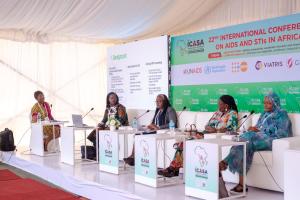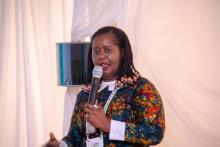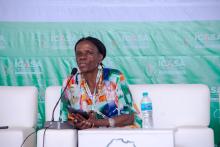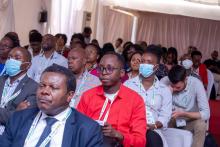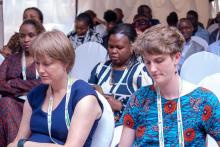Integrating Health Services: A Lifeline for HIV Patients Battling Noncommunicable Diseases
By Tatenda Chimbwanda
Harare, Zimbabwe- In Zimbabwe, 62-year-old Anna Chuma is a living testament to the intersectionality of HIV and noncommunicable diseases (NCDs). Diagnosed with HIV in 2001 and put on antiretroviral therapy (ART) in 2004, Anna's life has been a journey of resilience and survival. While her care was primarily focused on HIV, she learned that she was not immune to the conditions that affect the general population. In fact, she discovered that she was at a higher risk of developing certain conditions, such as cervical cancer. This revelation was a wake-up call to the potential health complications she could face. After months of excessive bleeding, Anna was diagnosed with fibroids and found with abnormal cells on her cervix which led to removal of her uterus Three years ago was found with hypertension during her routine visits for her ART medication. She is now on antihypertensives. She is routinely checked for Diabetes and her obesity.
Despite the challenges, she has managed to lead a fulfilling life, attributing her survival to the integrated health services provided by the Ministry of Health and Child Care (MoHCC) and the support from the Zimbabwe National Network of People Living with HIV, a community she is proudly a part of.
Anna's story underscored the importance of integrating health services during a World Health Organization (WHO) led session at the International Conference on AIDS and STIs in Africa (ICASA). The session, titled "Improving HIV & TB outcomes through noncommunicable disease integration," highlighted the enhanced outcomes achieved through this approach.
Dr Sharon Kapambwe, from the WHO's Regional Office for Africa, provided an overview of the heightened burden of NCDs among people living with HIV. She noted that the risk of cervical cancer is up to six times higher in women living with HIV than women in the general population, further emphasizing the urgency for integration of service delivery. Additionally, she shared the various guidance documents WHO has developed for integrating NCDs, mental health, and HPV screening into ART services.
Zambia's Ministry of Health shared their successful experience with health service integration, demonstrating its feasibility and benefits. This WHO-led session is one of ten that the organization facilitate during ICASA, intending to further promote integrated health services.
WHO in the African Region early this year supported five countries in the inclusion of NCDs and Mental Health in their Global Fund interventions proposal, 29 countries are implementing the WHO Package of Essential NCDs for PHC settings. In addition, the Africa Regional Committee adopted the PEN Plus strategy which is looking at management of severe NCDs at first level referral Health facilities.
ICASA 2023 is a prime platform to display the advancements and hurdles faced in tackling HIV, hepatitis, and STI epidemics across the WHO's African Region. WHO is scheduled hosting eight satellite sessions and two special sessions, presenting its latest scientific and normative work on subjects including differentiated service delivery, key populations, new HIV guidelines, pre-exposure prophylaxis (PrEP), TB prevention, outbreak preparedness, HIV-NCD integration, mother-to-child transmission elimination, malaria vaccines, and hepatitis. Moreover, WHO is playing a significant role throughout the conference, participating in the opening ceremony, plenary sessions, press conferences, workshops, bilateral meetings, and community engagement activities.



